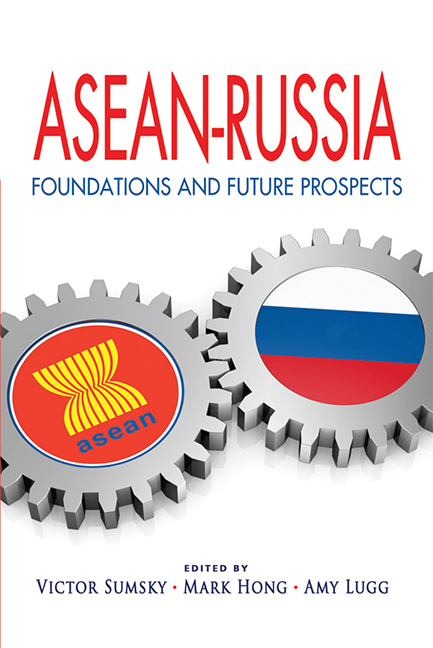Book contents
- Frontmatter
- Contents
- Foreword
- Preface
- About the Contributors
- Keynote Address
- Opening Remarks
- Keynote Address
- Introduction: Russia and the ASEAN Member States: Political and Economic Cooperation in Progress
- SECTION I WISEMEN'S VIEWS
- From Energy Partnership to Comprehensive Security in the Asia Pacific
- The Rise of Asia and Russia's Options
- ASEAN Regionalism and the Future of ASEAN-Russia Relations
- Thoughts on Asian Community Building
- Welcoming Russia's Participation
- SECTION II GEOPOLITICS
- SECTION III BILATERAL RELATIONS
- SECTION IV Business and Economics
- SECTION V CULTURE AND EDUCATION
- EPILOGUE
- Index
From Energy Partnership to Comprehensive Security in the Asia Pacific
from SECTION I - WISEMEN'S VIEWS
Published online by Cambridge University Press: 21 October 2015
- Frontmatter
- Contents
- Foreword
- Preface
- About the Contributors
- Keynote Address
- Opening Remarks
- Keynote Address
- Introduction: Russia and the ASEAN Member States: Political and Economic Cooperation in Progress
- SECTION I WISEMEN'S VIEWS
- From Energy Partnership to Comprehensive Security in the Asia Pacific
- The Rise of Asia and Russia's Options
- ASEAN Regionalism and the Future of ASEAN-Russia Relations
- Thoughts on Asian Community Building
- Welcoming Russia's Participation
- SECTION II GEOPOLITICS
- SECTION III BILATERAL RELATIONS
- SECTION IV Business and Economics
- SECTION V CULTURE AND EDUCATION
- EPILOGUE
- Index
Summary
INTRODUCTION
Energy security issues have been continuously raised at various Association of Southeast Asian Nations (ASEAN) forums and East Asia Summits (EAS). Energy serves as a strategic topic in the Russia-ASEAN dialogues as well. The reasons are obvious and clear. The struggle for energy resources has become the focal point of today's international politics. Energy issues fully relate to the Asia-Pacific area, which is increasingly acquiring the leading positions on the world economic scene.
RISING ASIA
According to the calculations of the Russian Academy of Sciences’ Institute of World Economy and International Relations, Asia's share in world gross domestic product (GDP) will reach 43 per cent in 2020, with China's share in real purchasing power terms to increase up to 23 per cent and that of India up to 8.4 per cent, while the share of the United States will drop to 18 per cent and that of Germany to 2.9 per cent. The energy requirements of the Asia countries will increase accordingly. The International Energy Agency predicts that China and India will contribute 45 per cent to the growth of world consumption of primary energy in the period up to 2030. The ASEAN members in their totality will become a major importer of energy resources in the near future as well.
RISING ENERGY NEEDS
The shortage of oil and natural gas resources in the Asia Pacific combined with the constantly growing consumption of hydrocarbons have on one side led to increasing imports from other parts of the world, first of all from the Middle East, which practically creates a dependency of Northeast Asia on the Middle Eastern oil and gas supplies. On the other side, the lack of hydrocarbons to fuel the traditional production of electrical energy stimulated the advancement of nuclear energy in the region. In addition to Japan, China and South Korea, such countries as Vietnam, Thailand, Indonesia and the Philippines have also started developing plans for the construction of nuclear power stations.
- Type
- Chapter
- Information
- ASEAN-RussiaFoundations and Future Prospects, pp. 3 - 7Publisher: ISEAS–Yusof Ishak InstitutePrint publication year: 2012



